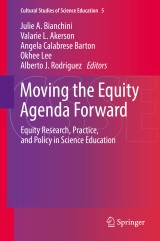Details

Moving the Equity Agenda Forward
Equity Research, Practice, and Policy in Science EducationCultural Studies of Science Education, Band 5
|
149,79 € |
|
| Verlag: | Springer |
| Format: | |
| Veröffentl.: | 11.08.2012 |
| ISBN/EAN: | 9789400744677 |
| Sprache: | englisch |
| Anzahl Seiten: | 378 |
Dieses eBook enthält ein Wasserzeichen.
Beschreibungen
This volume takes on the vital tasks of celebrating, challenging, and attempting to move forward our understanding of equity and diversity in science education. Organized thematically, the book explores five key areas of science education equity research: science education policy; globalization; context and culture; discourse, language and identity; and leadership and social networking. Chapter authors -- emerging to established US science education scholars -- present their latest research on how to make science interesting and accessible to all students. The volume includes international voices as well: Scholars from around the world crafted responses to each section. Together, authors and respondents attempt to refine our methods for examining equity issues across classrooms, schools, and policies, and deepen our understanding of ways to promote equity and acknowledge diversity in science classrooms. Moving the Equity Agenda Forward is endorsed by NARST: A Worldwide Organization for Improving Science Teaching and Learning Through Research. The volume gains authority from the fact that it was edited by one current and four former chairs of NARST’s Equity and Ethics Committee.
Introduction to Volume, Julie A. Bianchini.- Section 1: Science Education Policy, Okhee Lee, Julie A. Bianchini.- 1. Science for All: Historical Perspectives on Policy for Science Education Reform, George E. DeBoer.- 2. Is It Possible to Teach “Science for All” in a Climate of Accountability?: Educational Policy and the Equitable Teaching of Science, Sherry A. Southerland.- 3. Conceptions of Inequality in the Era of Bush/Obama, Nancy W. Brickhouse.- R1. International Response. Bridging the Gaps between Policy and Practice on Equity for Science Education Reforms: From National and International Perspectives, Mei-Hung Chiu.- Section 2: Globalization, Julie A. Bianchini, Valarie L. Akerson.- 4. The Imperative of Context in the Age of Globalization in Creating Equity in Science Education, Alejandro J. Gallard Martínez.- 5. Frameworks for Examining the Intersections of Race, Ethnicity, Class and Gender on English Language Learners in K-12 Science Education in the U.S., Sonya N. Martin, Beth Wassell, Kathryn Scantlebury.- 6.<b> </b>Elementary Students’ Ways of Seeing Globalization in Science<b>, </b>Bhaskar Upadhyay.- R2. International Response. Globalisation and Science education: A View from the Periphery, Lyn Carter.- Section 3: Context and Culture, Alberto J. Rodriguez, Okhee Lee.- 7. Race, Culture, Gender and Nature of Science in Elementary Settings, Leon Walls, Gayle A. Buck, Valarie L. Akerson.- 8. Conceptualizations of Context in Science Education Research: Implications for Equity, Eileen Carlton Parsons, Gillian U. Bayne.- 9. Allowing our Research on Urban, Low SES, African American Girls and Science Education to Actively and Continually Rewrite Itself, Gayle A. Buck, Cassie F.Quigley.- 10. Science Learning as Participation with and in a Place, Miyoun Lim, Edna Tan, Angela Calabrese Barton.- R3. International Response. Reflections on Context, Place-based Education and Science for All, Tali Tal.- Section 4: Discourse, Language and Identity, Angela Calabrese Barton, Alberto J. Rodriguez.- 11. The Language-Identity Dilemma: An Examination of Language, Cognition, Identity and their Associated Implications for Learning, Bryan A. Brown.- 12. Science, Language and Families: Constructing a Model of Steps to College through Language-rich Science Inquiry, Cory A. Buxton, Martha Allexsaht-Snider, Carlos Rivera.- 13. Relationships among Science Language, Concepts and Processes: A Study of English Learners in Junior High School Science Classrooms, Emily Kang, Julie A. Bianchini.- R4. International Response. Discourse, Language and Identity, Michael Reiss.- Section 5: Leadership and Social Networking, Valarie L. Akerson, Angela Calabrese Barton.- 14. NARST Equity and Ethics Committee: Mentoring Scholars of Color in the Organization and in the Academy, Maria S. Rivera Maulucci, Felicia Moore Mensah.- 15. Retrospective Accounts in the Formation of an Agenda for Diversity, Equity and Social Justice for Science Education, Felicia Moore Mensah.- 16. What Perspectives on Community-based Learning Can Teach Us about Organizational Support of Research and Policy Work in Equity and Diversity, Gail Richmond.- R5. International Response. Equity and Diversity in Science Education and Academia: A South American Perspective, Melina Furman.- Epilogue: Moving the Equity Agenda Forward Requires Transformative Action, Alberto J. Rodriguez.
<p>This volume takes on the vital tasks of celebrating, challenging, and attempting to move forward our understanding of equity and diversity in science education. Organized thematically, the book explores five key areas of science education equity research: science education policy; globalization; context and culture; discourse, language and identity; and leadership and social networking. Chapter authors -- emerging to established US science education scholars -- present their latest research on how to make science interesting and accessible to all students. The volume includes international voices as well: Scholars from around the world crafted responses to each section. Together, authors and respondents attempt to refine our methods for examining equity issues across classrooms, schools, and policies, and deepen our understanding of ways to promote equity and acknowledge diversity in science classrooms. </p><p>Moving the Equity Agenda Forward is endorsed by NARST: A Worldwide Organization for Improving Science Teaching and Learning Through Research. The volume gains authority from the fact that it was edited by one current and four former chairs of NARST’s Equity and Ethics Committee.</p>
Examines current science education research, practice, and policy Addresses five key areas of science education equity research Endorsed by NARST, a worldwide organization for improving science teaching and learning through research
Diese Produkte könnten Sie auch interessieren:

University Science and Mathematics Education in Transition

von: Ole Skovsmose, Paola Valero, Ole Ravn Christensen

96,29 €















